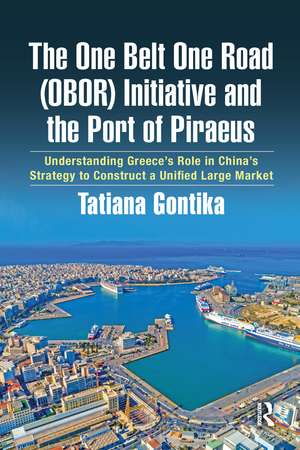The One Belt One Road (OBOR) Initiative and the Port of Piraeus: Understanding Greece’s Role in China’s Strategy to Construct a Unified Large Market
Autor Tatiana Gontikaen Limba Engleză Hardback – 6 aug 2021
OBOR, a signature initiative of Chinese President Xi Jinping, is currently one of the most frequently discussed enterprises worldwide. This controversial mix of worldwide projects has put both China and Xi at the center of attention, and not in a positive way. Of course, not all projects included in the initiative have been or are likely to be successful, but the initiative has far-ranging economic, cultural, and political potential. OBOR, in its essence, is an attempt by the Chinese government to secure a paramount position in global finance for the country and ensure that primacy extends far into the future. In particular, it is an attempt to ensure that there are enough natural resources for China to support itself in the long term. Therefore, the areas selected for the implementation and development of OBOR are deliberately strategic. One of the countries that China has chosen to invest in is Greece, specifically the Port of Piraeus.
The OBOR initiative has many similarities with the ancient Silk Road. Although the ancient route and modern concept are in no way identical, many similarities become evident when the two are compared. To understand China’s motivation to build such a network, looking back at history is required.
This project was long in the making. Various discussions took place both on an international and a domestic level until all parties came to an agreement. The deal at Piraeus between Greece and China affected more people than the politicians and the shipowners—it affected everyone involved in the operations of the port as well as the residents of the area. To further comprehend the impact on their lives, one must see things through their eyes, and there is no better way than contacting individuals and conversing with them.
In conclusion, the specific deal at Piraeus and the OBOR initiative as a whole have the potential of benefiting the international and local communities. However, specific measures must be taken, and governments must collaborate in order for the deal in Piraeus and the OBOR initiative to have the most beneficial and the least negative impact.
Preț: 328.88 lei
Nou
Puncte Express: 493
Preț estimativ în valută:
62.94€ • 65.21$ • 52.53£
62.94€ • 65.21$ • 52.53£
Carte tipărită la comandă
Livrare economică 21 martie-04 aprilie
Preluare comenzi: 021 569.72.76
Specificații
ISBN-13: 9781032051512
ISBN-10: 1032051515
Pagini: 136
Ilustrații: 6 Line drawings, black and white; 6 Illustrations, black and white
Dimensiuni: 152 x 229 x 15 mm
Greutate: 0.68 kg
Ediția:1
Editura: Taylor & Francis
Colecția Routledge
Locul publicării:Oxford, United Kingdom
ISBN-10: 1032051515
Pagini: 136
Ilustrații: 6 Line drawings, black and white; 6 Illustrations, black and white
Dimensiuni: 152 x 229 x 15 mm
Greutate: 0.68 kg
Ediția:1
Editura: Taylor & Francis
Colecția Routledge
Locul publicării:Oxford, United Kingdom
Public țintă
Professional and Professional Practice & DevelopmentCuprins
Introduction 1. China’s Historical Overview 2. Shipping & China Ocean Shipping Company (COSCO)3. Silk Road 4. One Belt One Road Initiative (OBOR) 5. Possible OBOR Routes & Their Concerns 6. Greece’s Historical Overview7. Piraeus Port 8. Greek Shipping 9. Road to Privatization 10. Insider’s View 11. The Expansion Conclusion
Notă biografică
Tatiana Gontika, is currently a graduate student in SUNY Maritime. Originally from Greece, she move to London when she was 18 and was accepted to Goldsmiths College, University of London -- she graduated in 2010 with a BA in Anthropology. In 2013, she moved to Colombia where she interned in La Personeria de Medellin, while studying Spanish in EAFIT (Escuela de Administracion, Finanzas e Instituto Tecnologico).
In early 2014, Tatiana moved to Buenos Aires where she stayed for the next four years. During her stay she worked in Evdemon & Partners as an office manager, as well as assistant office developer for Rio de Janeiro office. Tatiana was also head of the accounting department for both Buenos Aires and Rio de Janeiro offices. In August of 2018 Tatiana enrolled to SUNY Maritime from where she is expected to graduate in May 2020. Upon graduation Tatiana will pursue a career in Shipping in Greece or some other European country.
In early 2014, Tatiana moved to Buenos Aires where she stayed for the next four years. During her stay she worked in Evdemon & Partners as an office manager, as well as assistant office developer for Rio de Janeiro office. Tatiana was also head of the accounting department for both Buenos Aires and Rio de Janeiro offices. In August of 2018 Tatiana enrolled to SUNY Maritime from where she is expected to graduate in May 2020. Upon graduation Tatiana will pursue a career in Shipping in Greece or some other European country.
Descriere
One Belt One Road (OBOR), a signature initiative of Chinese President Xi Jinping, is currently one of the most frequently discussed enterprises. This controversial mix of worldwide projects has put China and Xi in the center of attention, and not always in a positive way.
